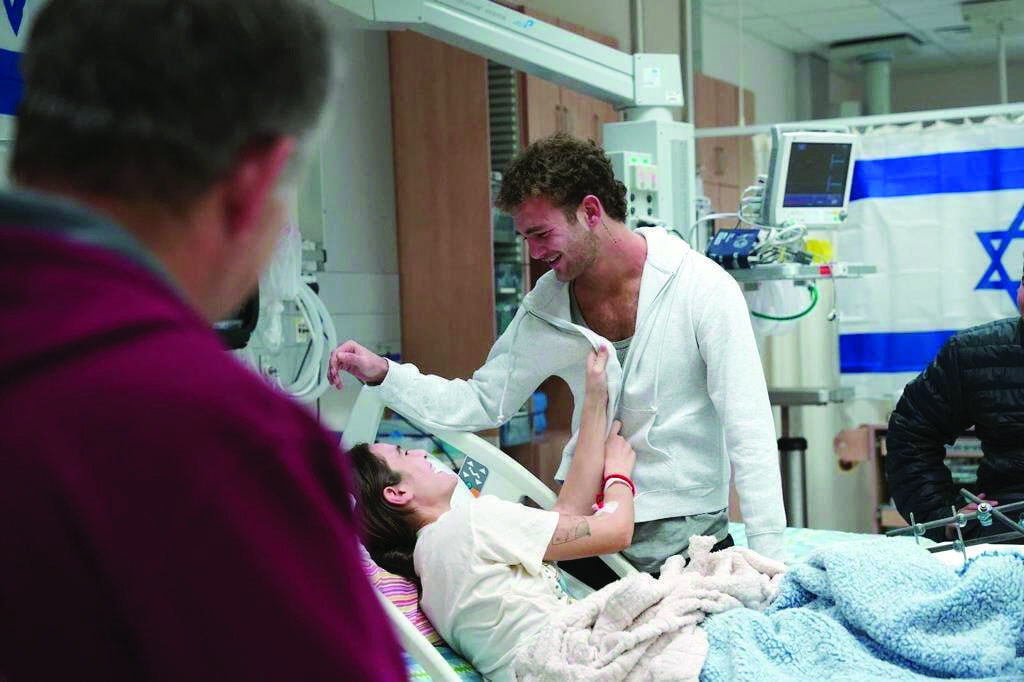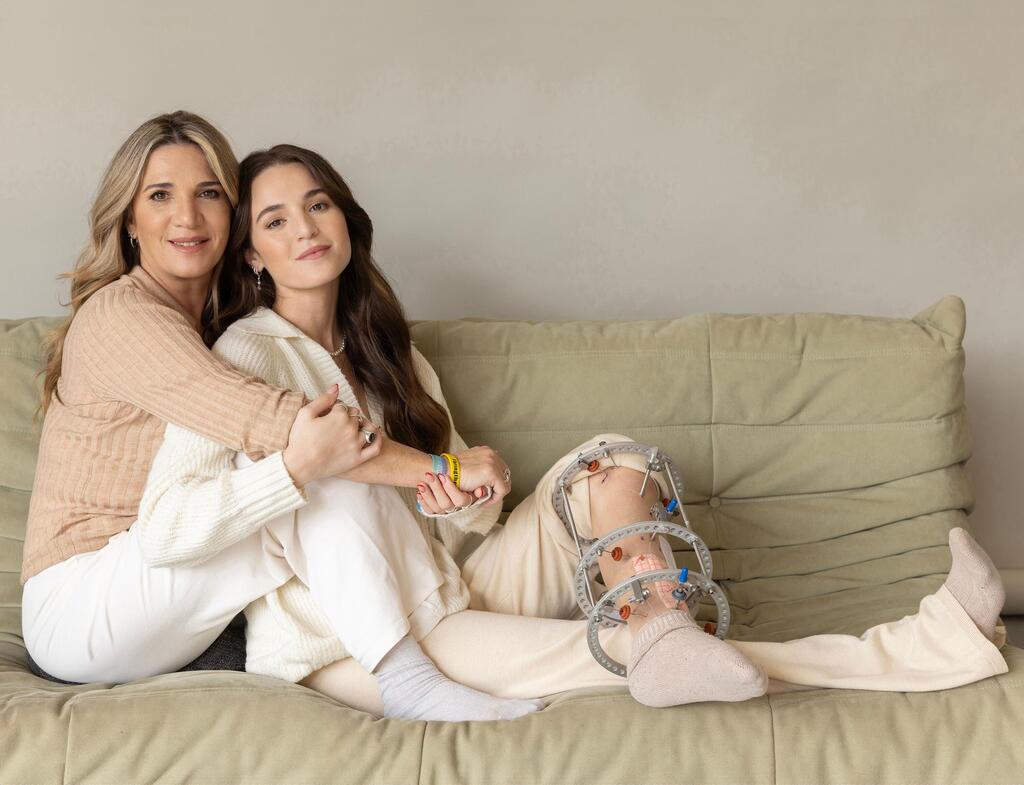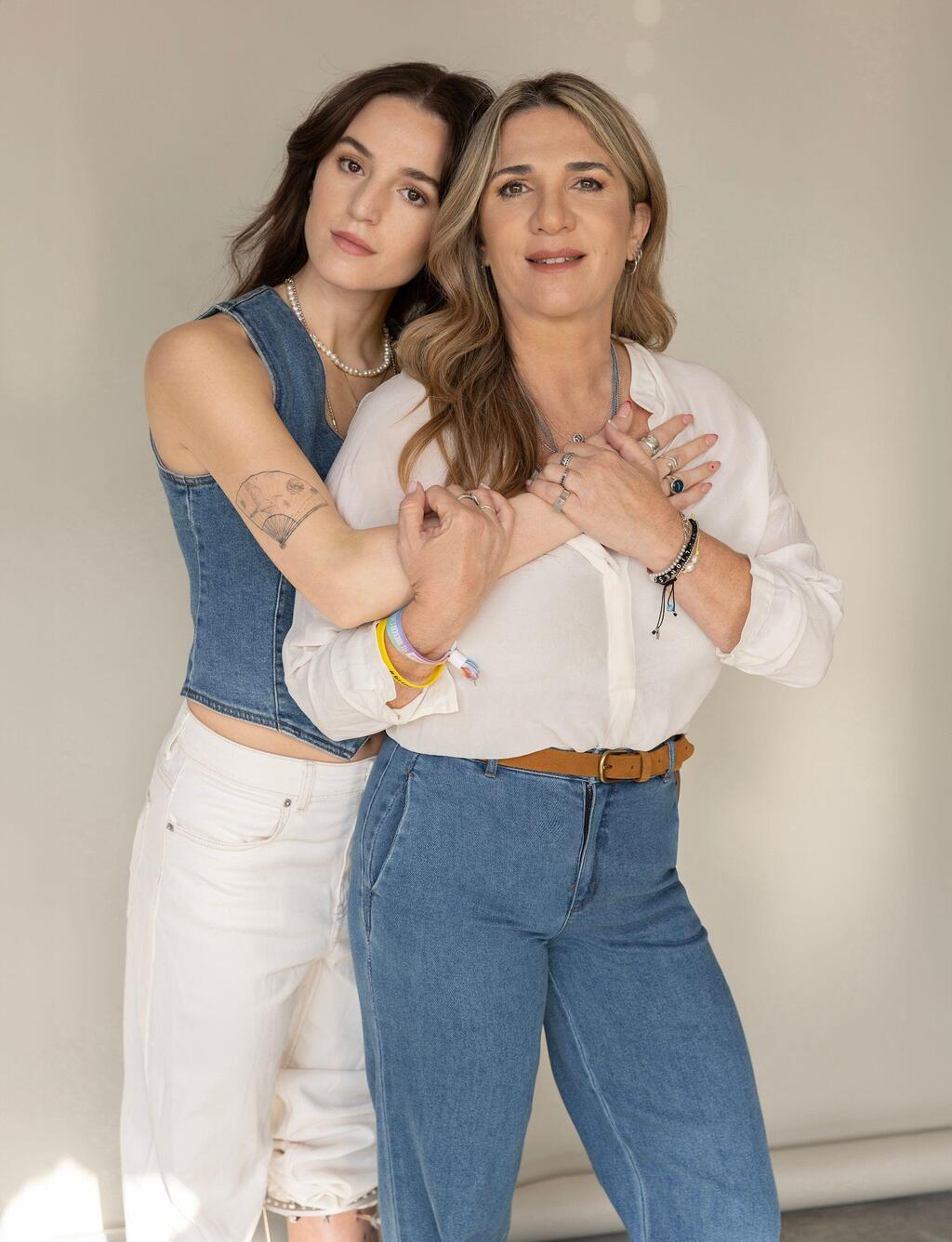Maya Regev had recently made a significant breakthrough in her recovery process: she began walking on her own. Maya shared a video on Instagram of her walking with crutches, captioning it: "Proud and excited. I am home, and so is my leg. I am walking. Omer, I wish you were here with me to see this."
More stories:
For Maya's mother, Mirit Regev, this achievement is nothing short of a miracle. "Maya walked on her leg for the first time since October 7, and it's a huge excitement," she said.
When Mirit woke up on the morning of October 7, her two children, Maya, 21, and Itay, 18, were already being held captive by Hamas in Gaza, after being abducted from the Nova Music Festival.
She found dozens of unanswered calls on her phone and couldn't understand why everyone was trying to reach her. The night before, she had landed in Israel with Maya, Itay and her youngest son, Guy, 14, after a dreamy three-week vacation in Mexico.
Maya and Itay had heard about the party from which they were abducted while they were still in Mexico, through Omer Shem Tov, 22, Maya’s close friend, who was also kidnapped with them.
How was the party?
"It was insane. When the sirens started, we thought it would be over soon. Only when someone passed by shouting 'Guys, run!' did we panic and start running. We ran for about an hour and a half until we couldn't anymore. At some point, we received a call from Uri Danino, a friend of a friend, who said he was coming back to pick us up, even though he was already safe outside.
“We got into his car and drove off, and then they started shooting at us. I got hit by two bullets in the leg, and Itay was hit in the thigh. I closed my eyes for a moment from the pain and fear, and when I opened them, the driver's seat was empty.
“I told Omer, 'Grab the wheel and step on the gas,' but the terrorists reached us and just pulled all three of us out of the car. I prayed that Uri had managed to escape. Only when I returned from captivity did I realize that he too had been abducted."
Mirit, what did that morning look like from your perspective?
"When I woke up, I had a bunch of missed calls and four voice messages from Maya. 'Mom, there was a siren, we're okay'; then 'Everything's fine, we're getting organized and heading home'; the third was 'Mom, I love you so much'; and the fourth 'If I'm not reachable, call Itay.'
“I returned one of the missed calls and reached Shon, a friend of Itay's. He asked me if I knew what was happening in the south. I said 'no,' and then he told me that terrorists had entered the area, and there were dead and abducted at the party location. I had no idea that the party was in near Gaza."
"The truth is, I no longer cared about dying. I prayed that if I were to die, it would be quick because I couldn't bear another injury. I was more afraid of being touched."
And if you had known?
"I wouldn’t have stopped them from going. Thousands of people live there; I didn’t know it was dangerous. I spoke with Ilan, my ex-husband, and he didn’t tell me that Maya had spoken to him; he didn’t want me to worry.
“She told him, 'They’re shooting at me, they’re shooting at me,' and then, 'That’s it, they shot me. I’m dying.' How could he tell me something like that? At ten thirty at night, they asked me to come to Lahav 433; I already thought I was going to identify bodies. As soon as I went downstairs, Ilan sent me the video of Itay and Omer being taken to Gaza, and I admit I was relieved. I thought, 'Okay, a week or two, the state will get a grip and bring him back.'"
Did you know what was happening with Maya?
"We saw her in a video of the guys running through the fields; I recognized her by the kimono of mine she was wearing, but I didn’t know if she had survived. On Monday evening, officers came to me with a psychologist and a social worker.
“As soon as I saw them, I thought, 'That’s it, I’ve lost my daughter.' But then the officer said that according to information held by the IDF, Maya and Itay were abducted by a terrorist organization. The relief that washed over me in that moment is indescribable. Only on Friday did it hit me that it wasn’t going to be resolved so quickly, and I fell into depression. I got into bed and didn’t want to leave it."
Was it the toughest day for you?
"The toughest day for me came three weeks later, when the military called me to provide a DNA sample. That same day, I performed the ritual of separating challah, and the rabbi's wife said something that really strengthened me: whenever an unpleasant image comes to mind, I should instead watch videos of Maya and Itay being happy."
What kind of unpleasant image haunted you?
"The thought of someone harming Maya, taking her aside, subjecting her to degrading acts, and then another person taking her tormented me. The mere thought of someone touching her was unbearable. Fortunately, she wasn't harmed, but I don't believe all the hostages were so lucky."
3 View gallery


Maya and Itay Regev reunite at the hospital after their release from captivity
(Photo: Soroka Medical Center)
What else gave you strength during those days?
"At first, I was offered psychological support. I met with a psychologist three times, but it didn't uplift me. I'm not religious, but I do have faith, so I committed to praying every morning, washing my hands upon waking, and lighting candles every day. I had a morning ritual: I would enter their rooms and speak to them, 'Be strong, mom is with you,' and I would read a chapter of Psalms in each room.
“Of course, the families of other hostages also provided me with strength; being with 240 families in the same situation was incredibly empowering. I became very close to Orin Zak-Gantz, the mother of the late Eden Zakaria. We walked hand in hand from the beginning, and her strength was an inspiration to me. We would sit and imagine Eden and Maya sitting together in captivity, looking out for each other, and I am so deeply saddened that she didn't get to see her daughter alive again."
Think of me as your daughter
“Since her release on November 25, after 51 days in captivity, Maya has been hospitalized at Sheba Medical Center, where efforts are underway to repair the damage inflicted on her leg in Gaza. Her leg is encased in a special cast designed to lengthen the bone that was shattered, to prevent future limping.
“She's missing four and a half centimeters, and every day they extend the bone a bit more, which is excruciatingly painful,” her mother shares.
For the first five days of her captivity, Maya’s foot was hanging by a thread. “The bullet shattered the bone connecting her calf to her foot, leaving the foot dangling because there was nothing to support it,” she recounts. “I was certain I was coming home without a leg. The pain was unbearable. Only after five days was I taken to the hospital for surgery. I told Itay, ‘Tell Mom and Dad I love them.’ I didn't know if I would return.'"
Were you afraid of dying?
"The truth is, I no longer cared about dying. I prayed that if I were to die, it would be quick because I couldn't bear another injury. I was more afraid of being touched. I constantly told the Hamas guard watching over me, 'Think of me as your daughter,' knowing he had a daughter my age. I tried to evoke empathy in him. At some point, he himself began to say that I was like his daughter. At first, I was very scared of him, but then I thought, 'Well, you're in Gaza, you've already been shot twice, what more could happen? Your parents probably think you're dead anyway.' Gradually, I started to test boundaries, trying to endear myself to him, cracking a joke here and there to see if he would laugh, gauging how far I could go and what I could request. I thought to myself, at worst, I'd die now rather than in a week."
What did you want to request?
"To pass a letter to Itay. I knew he was with Omer, and it was important for me to tell them that I was okay and for them to stay strong. I wanted to make sure they had food; occasionally, I would ask to pass my food to them, and the Hamas guard was very impressed by that. He said to me, 'You have such a good heart, it was a mistake to kidnap you, you shouldn't have been here.'"
Did anything change in your relationship after your captivity?
"I believe we've grown much closer since I returned, and Itay and I have also become closer. It's not that we don't fight, but there are many moments of love between us. Honestly, he's like my twin brother. When Omer invited me to the party, it was clear that Itay was coming with me. I bought two tickets and told him, 'Venmo me 400 shekels,' and to this day, he hasn't" (laughs).
Mirit: "I don't know if the relationship has changed, but I think so. I've changed, that's for sure; I'm much more accommodating and patient. For example, I don't make any decisions without asking them first. In the past, if friends or family wanted to visit, I would simply present it as a fact because my home was always open. Now, I ask for their permission. Their independence was taken from them in captivity; they had to ask even to use the restroom, and Itay didn't shower for 54 days. I'm gradually restoring their control over their lives. Itay is undergoing psychological therapy twice a week. He was supposed to enlist in the military, but his enlistment has been postponed."
A few months before her abduction, Maya had completed her military service as a combat fitness instructor. Before starting university, she wanted to experience life and had purchased a ticket for a grand trip to South America on December 28. Then, October 7 arrived, and everything came to a halt. "I felt it was my time, and instead, I was kidnapped to Gaza," she says.
What did you plan to study?
"I always wanted to do something related to medicine, but I never had the motivation to study for so many years. It was only there that I promised myself, 'If you get out of here, you're going to study medicine.' In captivity, I discovered I had strength, both mental and physical. I kept telling myself it's good that it's just me alone and not Itay or Omer, and how fortunate they are to have each other. I always knew I was strong, and captivity just proved to me how much. I hope the other hostages have the strength I had. Don't forget they've been there for twice as long as me or more. How is it fair that I can continue living my life while they are still there?"
Mirit adds, "Our family has indeed come together, but we must not forget those who remain there. Until everyone returns, our joy will not be complete."




